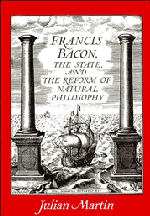Summary
And to the text of the common law – communis error facit jus – one doctor says, in favorabilibus; another says, facit jus, subintellege, dormire: but the learned judges can awaken it when it pleases them … we should consider the perils immanent in the present estate, who see in this time the desperate humours of divers men in devising treason and conspiracies – who being such men that, in the course of their ambition or other furious apprehensions, they make very small or no account of their proper lives. If to the common desire and sweetness of life the natural regard for their posterity be not adjoined, the bridle, I doubt, will be too weak: for when they see that whatever comes of themselves yet their posterity shall not be overthrown, they will be made more audacious to attempt such matters.
Argument in ‘Chudleigh's Case’ (1594), Works, VII, pp. 623, 633–4How was Bacon's natural philosopher to achieve certain knowledge about natural things, and how was he to put it to use? The obvious (but unhelpful) answer is that he was to follow a novel procedure: but just what was this procedure, and was it novel? Like his aspirations for natural philosophy, Bacon's proposed procedures were utterly novel for natural philosophers but they were not novel in any absolute sense.
- Type
- Chapter
- Information
- Publisher: Cambridge University PressPrint publication year: 1991



